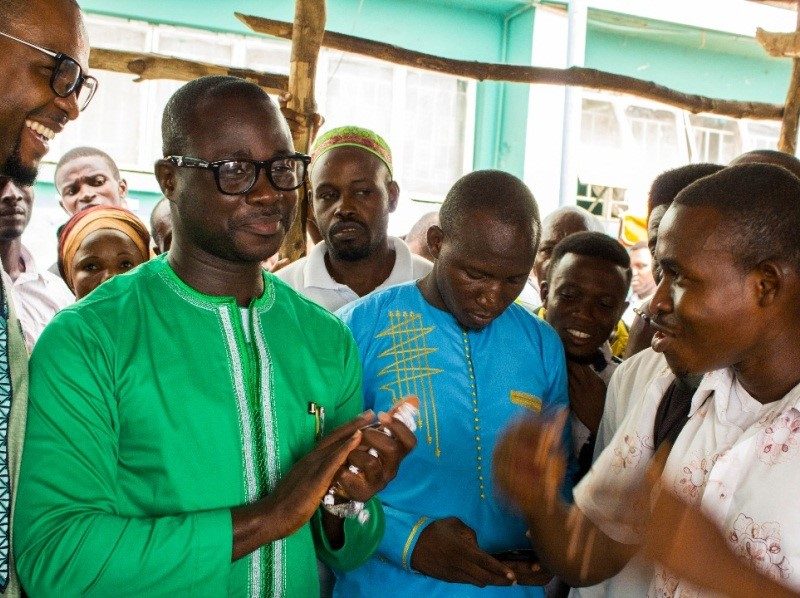End Of Ramadan Charity
ABOUT EID PRAYER
This is a little longer than usual but InshaAllah very beneficial and useful for every muslim around the world. This is our Last class for “FIQH OF RAMADAN” InshaAllah we will have the Final Exam on the Complete course on Frday the 25th of Shabaan’33 (4th of July’13).
ZAKATUL-FITHR
There is a Zakat payment due at the end of the month of fasting, called Ramadhan. The day that it is due is called ‘Eidul-Fitr, which is a day of celebrating the end of the fast. One of the Prophet’s Companions named Ibn ‘Umar, may Allah be pleased with them both, said:
“Allah’s Messenger (Peace be upon Him) enjoined the payment of one Sa’ of dates or one Sa’ of barley as Zakatul-Fitr on every Muslim, slave or free, male or female, young or old, and he ordered that it be paid before the people went out to offer the ‘Eid prayer.” (Al-Bukhari and Muslim)
Rulings on zakaat al-fitHr
The correct view is that it is fard (obligatory), because Ibn ‘Umar said: “The Messenger of Allaah (peace and blessings of Allaah be upon him) made zakaat al-fitr obligatory,” and because of the consensus of the scholars (ijmaa’) that it is fard.
(Al-Mughni, part 2, Baab Sadaqat al-Fitr).
The Wisdom Behind Zakatul-Fithr
Zakatul-Fitr purifies the fasting person from whatever shortcomings, such as foul or unnecessary speech, that he might have indulged in during his fast. It also saves the poor people from the humiliation of asking people for help on the day of the ‘Eid. One of the Prophet’s Companions named Ibn ‘Abbas, may Allah be pleased with them both, said: “The Messenger of Allah enjoined Zakatul-Fitr as a redemption for the fasting person from unnecessary or foul speech and as a food for the poor.” (Abu Dawud and Ibn Majah)
Who is obliged to pay it?
A man has to pay on behalf of himself and his wife – even if she has money of her own – and his children and parents if they are poor, and his daughter if she is married but the marriage has not yet been consummated. If his son is rich, he does not have to give zakaat al-fitr on his behalf. A husband has to give zakaat al-fitr on behalf of a divorced wife whose divorce (talaaq) is not yet final (i.e., she is still in the ‘iddah of a first or second talaaq), but not in the case of a rebellious wife or one whose divorce is final. A son does not have to give zakaat al-fitr on behalf of a poor father’s wife because he is not obliged to spend on her.
[When giving zakaat al-fitr], one should start with the closest people first, so he gives it on behalf of himself, then his wife, then his children, then the rest of his relatives in order of closeness, following the pattern laid out in the rules governing inheritance.
What Should be Given as Zakatul-Fithr
The amount to be given is one saa’ of food, according to the measure of saa’ used by the Prophet (peace and blessings of Allaah be upon him), because of the following hadeeth.
– Abu Sa’eed al-Khudri (may Allaah be pleased with him) said: “At the time of the Prophet (peace and blessings of Allaah be upon him) we used to give it in the form of a saa’ of food…” (Reported by al-Bukhaari, 1412).
A saa’ is approximately equivalent to three kilograms of rice.
As for giving zakaat al-fitr in the form of money, this is not permissible at all, because the Prophet (peace and blessings of Allaah be upon him) said that it must be given in the form of food, not money. He clearly stated that it is to be given in the form of food, so it is not permissible to give it in any other form and Islam wants it to be given openly, not secretly. The Sahaabah gave zakaat al-fitr in the form of food, and we should follow, not innovate.
The time for giving Zakaat al-fitr
It should be given before the Eid prayer, as is stated in the hadeeth that the Prophet (peace and blessings of Allaah be upon him) “commanded that it should be given before the people went out to pray.”
(Al-Bukhaari, 1407).
The best time to pay Zakatul-Fitr is the time from dawn on ‘Eid until just before the ‘Eid prayer. However, those who give it before the morning of the ‘Eid (i.e. a day or two before the ‘Eid) have properly fulfilled the obligation. Those who give it away after the ‘Eid prayer, it is considered as a voluntary charity (Sadaqah) only. In other words it is not counted as Zakatul-Fitr.
It is disliked (makrooh) to delay giving it until after Salaat al-‘Eid; some scholars said that this is haraam and is counted as qadaa’ (making up a duty that has not been performed on time), on the basis of the hadeeth, “Whoever pays it before the prayer, it is an accepted zakaat, and whoever pays it after the prayer, it is just a kind of charity.”
(Reported by Abu Dawood, 1371).
The Recipients of Zakatul-Fitr
Zakatul-Fitr is paid to the same eight categories of people who are eligible to receive the Zakat on wealth, as we explained before. The poor and the needy are the most deserving people for Zakatul-Fitr.
EID PRAYER
Sunnahs of Idul-Fitr Prayer
On the first day of Shawwal (the month that follows Ramadan) the person goes to the ‘id Mosque or praying ground having undertaken the following recommended acts:
- Total ablution (Ghusl).
- Dressed in the best of clothes (preferably new clothing).
- Assumed a breaking of the Fast by eating at least a few pieces of dates. This is in accordance with the tradition of the Prophet (peace be upon him), and an odd number is preferred i.e. 3, 5, 7, 9 and so on.
- It is Sunnah to say Takbeer loudly when leaving our homes to go to Eid Prayer.
- The Sunnah for Eid Prayers is to pray in the Musallah (that is in an uncovered place) and not in the Masjid. The Prophet [pbuh] never prayed Eid Prayer in the Masjid
- It is the practice (Sunnah) to head to the ‘id praying center by walking. Upon arrival at the place of prayer the person sits and waits for the prayer to begin.
Prayer of Eid ul-Fitr
1. After about 20 minutes from clear sun rise, the imam stands up for the prayer and loudly signifies the entering into prayer by reciting the “Takbiiratil lhraam” that is “ALLAHU AKBAR”. The whole congregation also follows suit by reciting the “Takbiiratil-lhraam”.
2. As usual, with any other prayer, the person thereafter comes up with the opening supplication known as “DUA AL ISTIFTAAH”.
3. After that, the Imam says “ALLAHU AKBAR” 6 more times and the congregation would follow likewise.
4. After completing the recitations of the words of greatness which total up to seven, the Imam would then seek the protection of Allah (subhanahu wa ta’ala) from the cursed satan in a low voice by saying “AUTHU B’LJBILLAHI MINASH SHAYTANIRRRAJIIM”. He would thereafter silently invoke Allah’s name by saying: “BISMILLAHIR- RAHMANI-R–RAHIIM” and then recite “AL FATIHAH” (the opening chapter of the Holy Qur’an) in a loud voice. The followers (congregation) would then say “Ameen” together loudly after the Imam completes reciting the “Al Fatihah”. Each follower would then recite “Al-Fatihah” silently. It is recommended that the Imam thereafter recites the whole of chapter 87 of the Holy Qur’an i.e. “SA BIHISMA ” (Glorified be the name of thy Lord, the Most high) or Chapter 50 Surah Al-Qaf. The followers are required to listen to the Imam’s recitation.
5. The Imam then raises his hands up to the level of his shoulders or ears performs “Rukuu” saying “ALLAHU AKBAR.” ‘Thereafter he raises his head up from bowing saying “SAMI’A ALLAHU LIMAN HAMIDA” followed by the congregation saying “RABBANNA WALAKAL HAMD”. The Imam and the congregation thereafter proceed to prostration saying “ALLAHU AKBAR”.
6. After the prostration, the Imam would resume the standing position for the second rakaat and the congregation would follow him up accordingly.
7. Thereafter, the Imam would say “ALLAHU AKBAR” 5 times and the congregation would perform likewise.
8. Then, the Imam recites “AL-FATIHAH” and for this second rakaat it is preferred that he thereafter recites the whole of chapter 88 of the Holy Qur’an i.e. “Al Ghasiya”, (The Disaster) or Chapter 54 Surah Al-Qamr and the congregation would listen attentively.
9. Thereafter, the Imam completes the Rukuu (bowing) and Sujuud (prostration) positions in the manner already discussed and sits back for the words of witness “At-Tashahud”. Then, the Imam concludes the prayer with the words of peace i.e. “ASSALAMU ALEYKUM WA RAHMATULLAH” and of course, the entire congregation would follow the Imam in all these acts as is the custom in all prayers.
- After concluding the prayer, the Imam would climb the pulpit to deliver the ‘Festival Sermon’, and starts the same with nine recitations of “ALLAHU AKBAR” with the congregation saying after him the same. After listening to the sermon, the congregation disperses. Listening to the sermon is not obligatory but is recommended.
- Jabir reported: “The Prophet [pbuh] used to come back from Eid-al-Fitr on a path other than the one used in going to it.” [Bukhaari]
Offering congratulations
The etiquette of Eid also includes the congratulations and good wishes exchanged by people, no matter what the wording, such as saying to one another TAQABBALA ALLAH MINNA WA MINKUM (May Allaah accept (good deeds) from us and from you) or “Eid mubaarak” and other permissible expressions of congratulations.
It was narrated that Jubayr ibn Nufayr said: When the companions of the Prophet (peace and blessings of Allaah be upon him) met one another on the day of Eid, they would say to one another, “May Allaah accept (good deeds) from us and from you.” Ibn Hajar said, its isnaad is hasan. Al-Fath, 2/446.
Idul-Adha Prayer
“IDUL ADHA”, (Feast of Immolation) prayer is performed on the 10th day of the 12th month of Islamic “Hijra” Calendar and is performed exactly in the same manner as enumerated and discussed above for the ‘Idul Fitr Prayer
Women going for Eid Prayer
It is not obligatory for women, but it is Sunnah. Women should offer this prayer in the prayer-place with the Muslims, because the Prophet (peace and blessings of Allaah be upon him) enjoined them to do that.
According to a report narrated by al-Tirmidhi: The Messenger of Allaah (peace and blessings of Allaah be upon him) used to bring out the virgins, adolescent girls, women in seclusion and menstruating women on the two Eids, but the menstruating women were to keep away from the prayer place and witness the gathering of the Muslims. One of them said, “O Messenger of Allaah, what if she does not have a jilbaab?” He said, “Then let her sister lend her one of her jilbaabs.” (Agreed upon).
Based on the above, it is clear that for women to go out and attend the Eid prayers is a confirmed Sunnah, but that is subject to the condition that they do not go out unveiled or making a wanton display of themselves, as is known from other evidence.
By Shk Alie
Stay with Sierra Express Media, for your trusted place in news!
© 2013, https:. All rights reserved.





